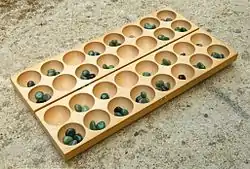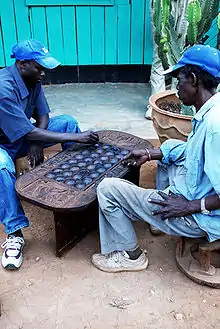List of mancala games
Popular games
The most widely played games are probably:
- Bao is a complex strategy game of Kenya and Zanzibar, played on a 4×8 board.
- Kalah is the ruleset usually included with commercially available boards; however, the game is heavily biased towards the first player, and it is often considered a children's game. The board is 2×6 with stores. The Pie rule can be used to balance the first-player's advantage.
- Oware, the national game of Ghana, is also known by Warri,[1] Ayo (Yoruba Name. Nigeria), Awele, Awari, Ouril, and other names. It has relatively simple rules but considerable strategic depth. The board is 2×6 (not counting optional stores).
- Omweso (also known as coro) is a strategic game of Uganda, played on a 4×8 board.
- Pallanguzhi is played in Tamil nadu, Southern India with 2 x 7 stores. Two varieties of this game are popular, Kaashi and Bank.
Games with unusual features
- Bohnenspiel is a German mancala based on a Persian game not unlike some African mancala variants. The board is 2×6 with 2 stores.
- Eson xorgol, a game played by the Kazakh minority in western Mongolia, is traditionally played with goat feces. The board is 2×5.
- ǁHus is a Namibian game. The board is 4×8.
Non-traditional games
- Conga (Martin Franke; Germany)
- Cups (Arthur Amberstone and Wald Amberstone; United States: New York)
- Devil Bunny Hates the Earth, where you try to save the world by jamming taffy machines. (James Ernest and Cheapass Games; United States: Seattle, Washington)
- Oh-Wah-Ree is a commercial variant of Oware with provision for more than two players.
- 55Stones is a modern mancala game with simultaneous moves.
- Kauri is a modern mancala game with two kinds of seeds.
- Mangala (Serdar Asaf Ceyhan; Turkey)
- Space Walk is a modern boardgame with mancala mechanic.
- Trajan is a modern boardgame variant with mancala mechanic.
- Five Tribes is a modern boardgame variant with mancala mechanic.
Traditional games
- Abangah (the Azande of Sudan) The board is 2×8 with stores.
- Adji-boto (Suriname)
- Agsinnoninka (Philippines)
- Ali Guli Mane (India—Karnataka)
- Anywoli (Ethiopia, Sudan)
- Aw-li On-nam Ot-tjin (Borneo)
- Aweet (Sudan, Namibia)
- Ba-awa (Ghana) The board is 2×6 with stores.
- Bajangkaq (Sumatra)
- Baqura (Mesopotamia)
- Bay Khom (Cambodia)
- Bau (the Wa Chaga)
- Beatta (Tayma)
- Bohnenspiel (Germany)
- Chanka (India, Sri Lanka)
- Chenna Maaney (In Tulu language, South India)
- Chisolo (Zambia)
- Chonka (Borneo)
- Chongka, or Tchonka (Marianas)
- Choro
- Chuncajon (Philippines)[2]
- Congkak (Indonesia, Malaysia) The board is 2×7 with stores.
- Coro (Ugando)
- Dakon (Java island of Indonesia)
- Dara-dara (Indonesia—Sulawesi)
- Daramutu (Sri Lanka)
- Ellaewala-kanda (Sri Lanka)
- En Gehé (Maasai of Tanzania)
- Gabata (Ethiopia)
- Galatjang (Sulawesi)
- Göçürme (Türkiye)
- Halusa (Mesopotamia)
- Hawalis (Oman)
- Igisoro (Rwanda - Burundi)
- Ingilith (the Turkana of Kenya)
- Isafu
- Isafuba
- J'erin (Nigeria)
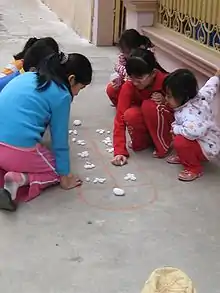
Vietnamese children playing ô ăn quan
- Kakumei (Japan)
- Kale (Gabon)
- Kaloleh (Sumatra)
- Kapo (Senegal)
- Kanji guti (India—Odisha)
- Kiela (Angola)
- Khutka boia (India—Punjab)
- Kisolo (also spelled Chisolo) (DR Congo and Zimbabwe)
- Kotu-baendum (Sri Lanka)
- Kombe (Kenya)
- Köçürme (Kırgızistan)
- Kubuguza[3]
- La'b Madjnuni (Syria)
- La'b Hakimi, or La'b Akila (Syria)
- La'b Roseya (Syria)
- Layli Goobalay (Somalia)
- Li'b al-ghashim
- Longbeu-a-cha (India—Assam)
- Lontu-Holo (the Maroon of Suriname)
- Madji (the Benni of Nigeria)
- Main chakot (Thailand)
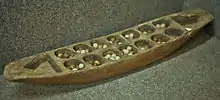 Thai Mancala board (possibly Mai Chakot or Mak Khom), as displayed in the Institute of Southern Thai Studies near Songkhla.
Thai Mancala board (possibly Mai Chakot or Mak Khom), as displayed in the Institute of Southern Thai Studies near Songkhla. - Mak Khom (Thailand)
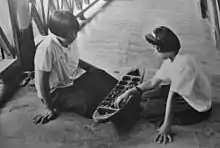 Photograph of two Thai girls playing with a mancala board, possibly the game Main Chakot or Mak Khom.
Photograph of two Thai girls playing with a mancala board, possibly the game Main Chakot or Mak Khom. - Mancala'h (Egypt, Syria)
- Mandoli (Greece— Hydra)
- Mangala (Egypt, Turkey - different rules)
- Matoe (Indonesia—Sumba)
- Mawkar katiya (India—Assam)
- Mbau (Kenya— Kilimanjaro region of the Rift Valley)
- Mechiwa (Bali)
- Mefuvha[4]
- Melegayası (Turkey) The board is 2×9 with stores.
- Mereköçdü (Azerbaijan) The board is a circle of six holes. Each player has 21 stones.
- Meuchoh (Sumatra—Aceh)
- Meulieh (Sumatra—Aceh)
- Meusueb (Sumatra—Aceh)
- Meuta' (Sumatra—Aceh)
- Minkale (Bin Kale) (Turkey)
- Mongale (Kenya)
- Mongola (Congo, Rwanda)
- Naranj (Maldives)
- Nsolo (Zambia)
- Ô ăn quan (Viet Nam) game is 2 mandarin boxes x5 ponds each, with 25 stones or tamarind seeds each
- Obridjie (Nigeria)
- Ouril (Cape Verde)
- Pachgarhwa (India)
- Vaamana Guntalu (Telugu name, India - Andhra Pradesh)
- Pallanguzhi (Tamil of India), also known as Pallankuli.
- Pereauni (Uganda)
- Poo (Liberia)
- Puhulmuti (Sri Lanka)
- Sai (Flores)
- Sat-gol (India)
- Songo[5]
- Sungka (Philippines)
- Til-guti (India)
- Toee (Sudan)
- Toguz korgool (Kyrgyzstan) The board is 2×9 with stores.
- Toguz Kumalak (Kazakhstan); same as Toguz korgool
- Vai Lung Thlan (the Mizo in Mizoram, India)
- Walak-pussa (Sri Lanka)
- Warra (United States)
- Wa-wee (Santa Lucia)
- 散窯 (Sàn yáo) (China—Henan)
- 老牛棋 (Lǎo niú qí) (China—Anhui)
- 分六煲棋 (Fēn liù bāo qí) (China—Guangdong)
References
- Henry R. Muller, Warri: A West African Game of Skill, The Journal of American Folklore. Vol. 43, No. 169. pp. 313-316.
- Stewart Culin, Philippine Games, American Anthropologist, Vol. 2, No. 4. (Oct-Dec 1900), pp. 643-656.
- Alan P. Merriam, The Game of Kubuguza Among the Abatutsi of North-East Ruanda. Man, Vol. 53. (November 1953), pp. 169-172.
- H. A. Stayt, The Bavenda.
- P. H. G. Powell-Cotton, H. J. Braunholtz, A Mancala Board Called "Songo.", Man. Vol. 31. (July 1931), pp. 123.
- H. J. R. Murray, History of Board Games other than Chess (1952)
- Laurence Russ, Mancala games (1984)
- H. J. Braunholtz, The Game of Mweso in Uganda., Man. Vol. 31. (July 1931), pp. 121–122.
- Arslan Küçükyıldız, Köçürme / Mangala, Ankara, Delta (2015)
External links
This article is issued from Wikipedia. The text is licensed under Creative Commons - Attribution - Sharealike. Additional terms may apply for the media files.
